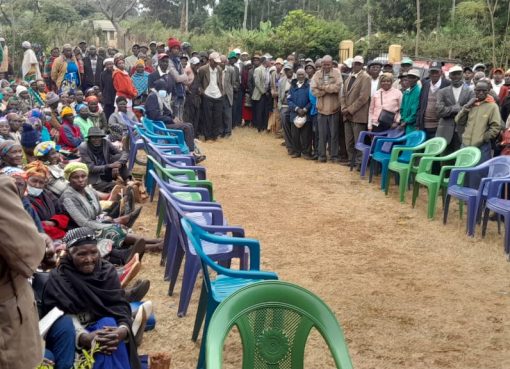Kenyans marked the International Day against Drugs Abuse and Illicit trafficking Sunday, with anti-drug advocates calling for expansion of rehabilitation service to cater for the needs of 13,000 addicts in Mombasa County.
The event kicked off with a procession that started at the iconic tusks along the busy Moi Avenue to the Treasury Square, where speaker after speaker expressed the need for more rehabilitation clinics and stakeholders’ participation in the fight against drugs.
Muslims Education Welfare Association (MEWA) and Reach out Center Trust (RCT) appealed for establishment of fully fledged operational methadone clinics in each of the six sub-counties to accelerate the rehabilitation of addicts.
RCT Director Taib Abdulrahman revealed that whereas 10,000 addicts require rehabilitation, a paltry 1000 are under rehabilitation, 2000 on methadone and 500 under psychosocial support.
“We thank the national government for establishing Miritini Treatment and Rehabilitation Centre, which is the first public facility to rehabilitate drug addicts,” added Abdulrahman.
He said the facility with 30 bed capacity only handles 400 out patients on methadone and passionately appalled for operationalization of three newly established clinics in Likoni, Changamwe and Nyali sub-counties.
“We have three functional methadone centers in Miritini, Shimo la Tewa and Free Town and we appeal for the operationalization of three others clinics at Kanderboy dispensary, Port Reitz hospital and Shika Adabu in Likoni to handle the soaring numbers of clients,” he added.
The National Authority for the Campaign Against Alcohol and Drug Abuse (NACADA) Coast Regional Manager Karisa George called on Mombasa county government to operationalize the county liquor licensing act 2014.
Karisa stated that the operationalization of liquor licensing act would pave a way for the county government to use levies collected from bars and spirit businesses towards rehabilitation of drug addicts.
“However, that has not been done since the act came into use. We urge the county government which handles provision of health services to find the need of allocating funds to rehabilitate affected youth,” he added.
The Manager indicated that Mombasa has the highest number of the 18,000 Injecting Drugs Users (IDUs) in the coastal region, most of whom consume heroin and other hard drugs.
“A recent study we did across the region also points out that Mombasa also has the highest bhang users along with other substance abuse. This requires efforts from state and non-state actors to find lasting solutions,” added Karisa.
He further called on the county government to privatize drug rehabilitation services to allow entry of the private sector players to compliment the government in addressing “the health catastrophic.”
Mombasa Sub-County Deputy County Commissioner Ronald Mwiwawi revealed that drug abuse has penetrated into local schools endangering the well-being of learners.
“It’s a problem that has now spread to schools leading to proliferation of gangs in learning institutions as a result of drug influence,” added Mwiwawi.
He further indicated that some matatus plying routes within Island and Mainland areas are used in drug trafficking.
“We have specific matatus carrying students to school and back and a lot is taking place inside. Parents have to be vigilant and not allow the government to do everything,” he added.
Mwiwawi, who represented county commissioner John Otieno, during the world drug day, said many schools within Mombasa Sub-county are grappling with advanced effects of drugs and substance abuse.
He challenged NACADA and other partners to roll out a reach out programme in schools to sensitize learners on the dangers of illicit use of hard drugs.
“Some of drug peddlers are using their school going children to supply drugs to our schools. This is happening in the full glare of our society. We call upon our community to identify the culprits who live within our midst,” stated Mwiwawi.
He further called on the residents to provide credible intelligence by working closely with local Chiefs and assistant Chiefs, whom he revealed face threat to their lives from the drug dealers.
The Deputy county commissioner also said unregulated pubs and bars selling wines and spirits are also fueling the sale of drugs and substance abuse and called for close collaboration between the county government and national government in regulating the operations of such premises.
“We have wine and spirits selling points spread everywhere without proper monitoring and regulations,” he added.
MEWA director in charge of harm reduction Abdallah Badru challenged the Mombasa county assembly to approve a substance abuse bill that will allow the county government to finance rehabilitation of addicts.
While revealing that high muguka consumption among local youths has fueled mental health cases, Badru called for concerted efforts to reverse the trend in the county.
“Youth between 10-15 youth who consume muguka have led to cases of depression and post traumatic disorders among the consumers. This is a societal challenge. We should all put a brave face to offer solutions,” he added.
Mvita MP Abdulswamad Nassir pledged to work with anti-drug activists and organizations in providing solutions to challenges facing their work including rehabilitation of addicts.
Abdulswamad noted that the successful implementation of the needles and syringes programme had helped reduce infection of HIV and hepatitis among drug users.
He further pledged to support existing drug rehabilitation centers with human and financial resources to admit more users undergo rehabilitation.
“I will also work with partners to ensure recovered drug abuse gets admitted to technical and vocational training institutes to provide them with life skills training to help them pick up in their lives as they integrate in the society,” he added.
The theme of this International Drugs day, Addressing drug challenges in health and humanitarian crisis, aimed at creating awareness towards a world free of drug abuse, in collaboration with the United Nations Office on Drug and Crime (UNODC).
By Galgalo Bocha




